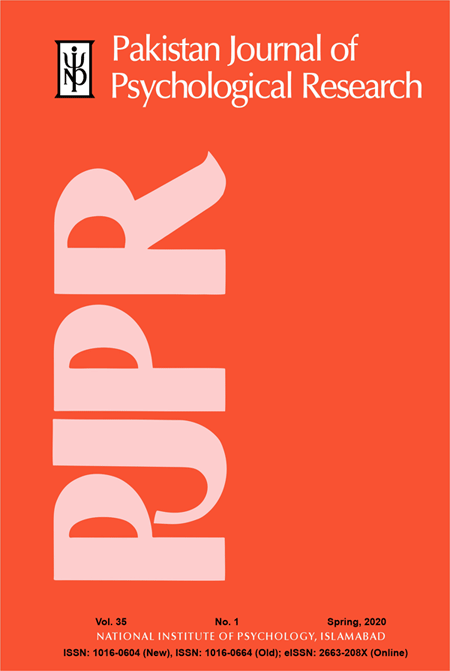Ethical Approval
Pakistan Journal of Psychological Research is committed to upholding the integrity of the published work, which relies mainly on the ethical practices of everyone involved in the process. We encourage our authors, reviewers, and editors to refer to the Guidelines on the ethics of research and published codes of conduct developed by the Committee on Publication Ethics (COPE)
Research Involving Human Subjects
While reporting the research that involves human subjects, human material, human tissues, or human data, the authors must declare that the investigations were carried out following the rules of the Declaration of Helsinki of 1975 , revised in 2013, that confirms (at point 23 of declaration) that study was approved by the ethical committee of the relevant institution, and attest that the study was undertaken following the ethical standards as defined by the Declaration of Helsinki. The Ethical approval letter in the Materials and Methodssection of the article should at least have a statement of project identification code, approval date, and names of the ethical committee members along with their affiliations. Data related to individual participants must be described in detail, but private information identifying participants need not be included unless the identifiable materials are of relevance to the research (for example, photographs of participant's faces that show a particular symptom). If the study is exempted from requiring ethical approval, it should be mentioned in the manuscript, explaining the reasons for exemption. The editors reserve the right to reject any submission that does not meet these requirements.
"All participants gave their informed consent for inclusion before they participated in the study. The study was conducted following APA ethical guidelines and the Declaration of Helsinki, and the Ethics Committee approved the protocol of XXX (Project identification code)."
- Written informed consent for publication must be obtained from participating individuals who can be identified.
- Participants' initials or other personal identifiers must not appear in any image.
- For manuscripts that include any case details, personal information, and/or images of participants, authors must obtain signed informed consent from participants (or their relatives/guardians) before submitting to the Pakistan Journal of Psychological Research.
- Participants' details must be anonymized as far as possible, e.g., do not mention specific age, ethnicity, or occupation where they are not relevant to the conclusions.
- You must otherwise provide a detailed justification of why informed consent is not necessary.
Pakistan Journal of Psychological Research requires an approval, permission, or release form including an unlimited license for publication in all formats (including print, electronic, and online), in sub-licensed and reprinted versions (including translations and derived works), and in other works and products under open access license. To respect participants' and any other individual's privacy, please do not send signed forms. However, the journal reserves the right to ask authors to provide signed forms if necessary.
Ethical Guidelines for the Use of Animals in Research
The editors will require that the benefits potentially derived from any research causing harm to animals are significant concerning any cost endured by animals and that the procedures followed are unlikely to offend the majority of readers. Authors should particularly ensure that their research complies with the commonly-accepted '3Rs':
- Replacement of animals by alternatives wherever possible,
- Reduction in the number of animals used, and
- Refinement of experimental conditions and procedures to minimize the harm to animals.
Any experimental work must also have been conducted following relevant national legislation on the use of animals for research. For further guidance, authors should refer to the Code of Practice for the Housing and Care of Animals Used in Scientific Procedures.
Manuscripts containing original descriptions of research conducted in experimental animals must include details of approval by a properly constituted research ethics committee. As a minimum, the project identification code, date of approval, and the name of the ethics committee or institutional review board should be cited in the Methods section.
Pakistan Journal of Psychological Research endorses the APA guidelines for reporting experiments using live animals.
Retrospective Ethics Approval
If a study has not been approvedby the ethical committee before commencing the research, a retrospective ethical approval can’t be obtained, and thus, it will not be possible to consider the article for peer review, and the decision on whether to proceed to peer review lies at Editor’s discretion.
Ethical Approval for Retrospective Studies
Though retrospective studies are conducted on the data or material already available, where informed consent is either not needed or difficult to obtain, ethical approval, however, can be required based on the law and the national ethical guideline of the respective country, therefore, authors should check with theirrelevantinstitutions to assurecompliance with the specific requirements by the law.


